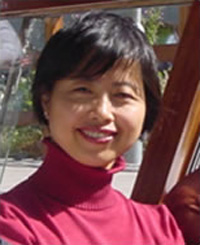Oklahoma State University Professor of Physics Dr. Aihua Xie has been elected to serve as chair of the Biological Physics Commission of the International Union of Pure and Applied Physics (IUPAP).
“I am honored to serve as the chair of this commission, known as C6, and I will dedicate my energy and experience to promoting and strengthening a variety of worldwide exchanges in biological physics,” said Xie.
In her current position at OSU, Xie integrates experimental and computational research that combines physics, chemistry and biology. Her research group is developing an emerging technology known as infrared structural biology, which has wide applications in biomedical research, bioenergy and agriculture sciences. Xie’s group also conducts fundamental research that explores how proteins perform their biological functions. She introduced the concept of “electrostatic epicenter” for “protein quake” that found applications in cancer research. 
Xie currently directs the state-of-the-art infrared (FT-IR) research facility at the Henry Bellmon Research Center at OSU. She joined OSU in 1997 as a visiting professor and has served as a professor of physics since 2006. She is a Fellow of the American Physical Society.
Prior to this new appointment as chair of C6, Xie served as vice chair from 2001-2014, the 2011 chair of the division of biological physics of the American Physical Society, and executive chair of the 8th IUPAP International Conference on Biological Physics in 2014.
Xie received her bachelor’s degree in physics from Zhejiang University in China. Through the US-China exchange program in physics, she moved to the United States in 1981 and earned her doctorate in physics and biophysics from Carnegie Mellon University in 1987. She pursued postdoctoral research in biological physics at the University of Illinois at Urbana-Champaign and worked as a research scientist in biophysics at Albert Einstein College of Medicine in New York before coming to OSU in 1997. Xie was a visiting scientist at the University of Chicago in 2003 and at Princeton University in 2004.
Established in 1922, IUPAP is committed to assist in the worldwide development of physics, to foster international cooperation in physics, and to help in the applications of physics toward solving problems of concern to humanity.
The C6 commission is tasked to stimulate and promote international cooperation in biological physics from both developing and developed countries, to actively sponsor international conferences that facilitate exchange of information form worldwide biological physics communities, and award scientific prizes in biological physics.
